|
|
|
Sort Order |
|
|
|
Items / Page
|
|
|
|
|
|
|
| Srl | Item |
| 1 |
ID:
189654
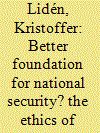

|
|
|
|
|
| Summary/Abstract |
Aiming at analysing all major security risks to a country, comprehensive National Risk Assessments (NRAs) can be used as a foundation for national security policies. Doing so manifests a modernist dream of securing societies through the anticipatory governance of risks. Yet, this dream resembles a nightmare of undemocratic state control in the name of security. Based on a critique of the politics of NRAs, this article offers a theoretical framework for evaluating their scientific and political credentials. Drawing on political theory of technocratic expert rule, ethical criteria of epistemic reliability and political representation are introduced to the debate. These criteria are then applied to an analysis of the NRAs of Sweden, Denmark, Finland, Norway and Iceland. I argue that although these NRAs are convincing correctives to the risk perceptions of politicians and civil society, they are insufficiently reliable and representative for defining the scope and priorities of national security policies at large.
|
|
|
|
|
|
|
|
|
|
|
|
|
|
|
|
| 2 |
ID:
189656
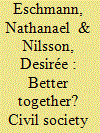

|
|
|
|
|
| Summary/Abstract |
Extensive research has been conducted in the field of peacebuilding concerning the role of civil society in peace negotiations. However, although research has stressed the importance of coordination among civil society groups, we have limited knowledge concerning the impact civil society coordination can have on the content of a peace agreement. This article addresses this gap by examining how the extent of coordination among civil society groups during peace negotiations influences the reflectiveness of a peace agreement in regard to civil society viewpoints. We argue that a high extent of coordination, where civil society actors coordinate tasks and spearhead viewpoints together, can help facilitate peace agreements that are more reflective of civil society group views. Based on a comparative analysis of Guatemala and El Salvador, the findings show that whereas coordination between different civil society groups was quite extensive in both peace processes, civil society viewpoints were inscribed into the peace agreement to a larger extent in the Guatemalan case. We identify two factors that contribute in shaping how coordination influences the content of peace accords: symmetrical transfer of information, and openness from the negotiation parties to consider suggestions from civil society.
|
|
|
|
|
|
|
|
|
|
|
|
|
|
|
|
| 3 |
ID:
189657
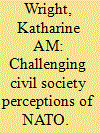

|
|
|
|
|
| Summary/Abstract |
Engagement with the Women, Peace and Security (WPS) agenda by military actors has caused concern among some of its civil society advocates. For example, NATO has adopted the WPS agenda as an increasingly visible part of its self-narrative. Yet what had distinguished NATO’s engagement with WPS from many other actors is that it came without civil society involvement. The establishment of a Civil Society Advisory Panel (CSAP) on WPS in 2014 is therefore highly significant for both NATO and the WPS agenda. Despite this, the efficacy of such consultation is not clear-cut nor its potential to mitigate militarised understandings of WPS and support transformative engagement with the agenda, particularly given the wariness of some civil society to engage with NATO. Drawing on interviews with civil society, this article interrogates their perceptions of NATO in order to understand the potential of such engagements to support transformative understandings of WPS and more broadly the efficacy of civil society engagement with military institutions. In so doing, it examines how such consultation adds to our understanding of NATO as an institution of international hegemonic masculinity.
|
|
|
|
|
|
|
|
|
|
|
|
|
|
|
|
| 4 |
ID:
189659
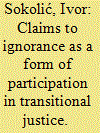

|
|
|
|
|
| Summary/Abstract |
Transitional justice is premised on participation that allows local publics to construct, critique and have some ownership over the process. The current scholarship assumes that individuals openly express their views of the process, or that they remain silent. The scholarship has neglected a third, significant form of participation: active withholding of views by saying ‘I don’t know’. This article examines such claims to ignorance and argues that they can provide insight into participation. While both qualitative and quantitative researchers of transitional justice have observed a pervasive pattern of high ‘don’t know’ responses, such claims to ignorance have not been studied. This article develops a theoretical framework that shows that ‘don’t know’ responses are a valuable source of information and argues that they are often an expression of a lack of willingness to respond, rather than genuine ignorance. Drawing on an original corpus of data collected through inter-ethnic focus groups and surveys conducted in four former Yugoslav countries, the study demonstrates how claims to ignorance are constructed as novel manifestations of resistance, restraint or disentitlement. These point to a rejection of transitional justice, which needs to be addressed if individuals are to feel like legitimate participants in the process.
|
|
|
|
|
|
|
|
|
|
|
|
|
|
|
|
| 5 |
ID:
189660
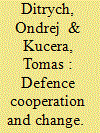

|
|
|
|
|
| Summary/Abstract |
This article situates recent initiatives to deepen security and defence cooperation in the European Union in the historical perspective. It proposes a model of constitutive relationship between the process of change in a security community and the formation of a transnational defence industry community of practice which yields positive feedback (‘productive returns’) to the security community as a broader assemblage within which it was constituted. This model is applied to the paradigmatic case of European security community that formed after the World War II (WWII). The analysis shows that the key driver for defence integration traced by means of social network analysis (SNA) in this case was economic rather than political, and for an extended period of time it developed without formal institutions. The productive return of the ‘defence industry machine’ as a distinct community of practice that was constituted through the integration process consisted in the sense of deeper belonging and a shared sense of working well together in a traditionally highly nationalised defence milieu.
|
|
|
|
|
|
|
|
|
|
|
|
|
|
|
|
| 6 |
ID:
189655


|
|
|
|
|
| Summary/Abstract |
Finland promoted a value-based agenda as the President of the European Union (EU) Council in 2019. The focus was especially on the defence of the rule of law principle. A role as a strong value promoter departs from the pragmatic and cautious tradition of Finnish EU policy. In this article, I will ask why Finland chose to promote values, and what kind of political debate preceded its Presidency term. Second, I will look at the actual promotion of the common values during the Presidency. Third, I will provide some evaluations of the success of Finland’s value-based approach. The analysis draws from comprehensive documentary sources related to Finnish EU policy and her Presidency term, and from 33 semi-structured research interviews among the key Finnish politicians, civil servants and civil society organization representatives in 2020. The article shows that values were thoroughly debated before the term and their relevance increased as the Presidency approached. Finland also succeeded in promoting several values, especially by linking them to practical questions. The article argues that evaluating the success of Finland’s approach is more contentious, which may be tackled several ways.
|
|
|
|
|
|
|
|
|
|
|
|
|
|
|
|
| 7 |
ID:
189658


|
|
|
|
|
| Summary/Abstract |
How has the sentiment around the “responsibility to protect” (R2P) changed over time? Scholars have debated far and wide whether the political norm enjoys widespread discursive acceptance or is on the brink of decline. This article contends that we can use sentiment analysis as an important indicator for norm validity. My analysis provides three crucial insights. First, despite the well-known fear of some scholars, R2P is still frequently invoked in Security Council deliberations on issues of international peace and security. Second, overall levels of affirmative language have remained remarkably stable over time. This finding indicates that R2P is far from being obliterated. Out of 130 states, 4 international organizations (IOs), and 2 non-governmental organizations (NGOs) invoking the norm, 65% maintain a positive net-sentiment. Third, zooming into Libya as a case illustration of a critical juncture, we see some minor tonal shifts from some pivotal member states. Adding the fact that interest constellations within the Permanent Five are heterogeneous concerning the third pillar of R2P, future military interventions, sanctioned under the norm, seem unlikely.
|
|
|
|
|
|
|
|
|
|
|
|
|
|
|
|
|
|
|
|
|